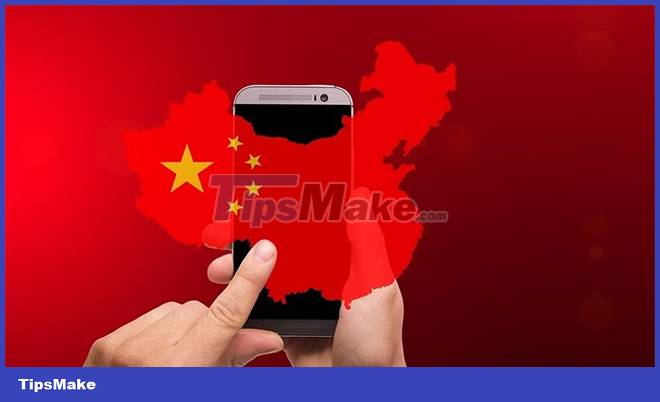5 server locations to avoid when using a VPN
VPNs can help bypass these barriers. However, not all server locations offer the same degree of freedom to access the Internet. While some countries have excellent Internet infrastructure and are known for their ability to protect data, others do not protect user privacy.
So, which countries require additional security precautions for VPN connections?
5 server locations to avoid for VPN connections
Whether you're using a VPN for torrenting, gaming, streaming, or casual browsing, the country you're connected to can greatly affect your online experience. Connecting to a bad server location will undermine your privacy, reduce your Internet speed, or even land you in jail in some countries.
Based on extensive research, here are 5 countries you should avoid connecting to when using a VPN.
1. North Korea
Little is known about how the People's Republic of North Korea governs Internet activity and VPN usage. Only a small fraction of the population, including government officials, researchers, and students from elite universities, have access to the global Internet. The remaining citizens can only use a highly limited intranet service called "Kwangmyong".
Since Kwangmyong is a closed service, VPN does not work with it. Even if you can find a VPN with North Korean servers, connecting to them won't do you any good. Access to most social networking sites and news sites is blocked. This means you won't be able to scroll through Facebook, YouTube, Twitter and international news sites if you decide to get a North Korean IP address. Most websites load very slowly and only a few are updated regularly.
Since Internet use is allowed only to a few privileged individuals, it is practically impossible to obtain information about Internet performance. According to Comparitech, the most recent survey of global internet speed comparison (including North Korea) was conducted by Akamai in June 2016. With an average speed of 2 Mbps, North Korea ranked 134th out of 170 countries in terms of Internet speed. It's no surprise that North Korea's digital infrastructure isn't suitable for a smooth VPN connection.
2. China

China has the largest and most sophisticated censorship apparatus in the world. This censorship system, also known as the Great Firewall, has been around since the late 90s and blocks any content that the government doesn't agree with.
In 2018, the government increased already high levels of censorship by banning unlicensed VPNs. This means that only state-approved VPN services can operate in the country. This provision provides the government with a 'backdoor' to monitoring the web activity of VPN users, which essentially defeats the purpose of using a VPN.
Despite the VPN ban, there have been no cases of travelers being fined or detained for using VPNs. So while it's hard to get a VPN in China, you can still avoid restrictions by downloading a VPN before you go there.
But keep in mind that you won't be able to access most social media platforms like Facebook and YouTube, international news sites like The New York Times, and foreign magazines with Chinese IP addresses.
3. Russia
When it comes to cybersecurity, Russia is always the 'top' name, and often for negative reasons. No wonder the Russian government goes to great lengths to monitor Internet use within its borders.
Since 2017, the government has banned the use of unapproved VPNs. VPN service providers that still operate in Russia must agree to certain terms, including those requiring companies to record user data. This is why most trusted VPNs, such as ExpressVPN, NordVPN and IPVanish don't have any servers in Russia to protect user privacy.
4. Iran

Unlike North Korea and Russia, VPN laws in Iran are much lax. But since protests against Mahsa Amini's death began on September 16, 2022, the Iranian government has taken measures to stop the use of VPNs.
The country has a history of blocking access to some social apps and implementing frequent Internet disconnections in certain areas. So when WhatsApp and Instagram were blocked after the protests, users turned to VPNs to bypass the restrictions. As reported by Top10VPN, VPN demand has increased by more than 3,000% since the beginning of the protests.
To make it more difficult to access VPNs, Iran has blocked the Apple App and Google Play Store, and is planning to criminalize the sale and use of VPNs. The country has started blocking VPN provider websites and deactivating VPN servers in Iran. With widespread censorship and lack of accessible, but not very useful VPN servers.
5. Syria
Following the Syrian civil war, access to online services and websites has been severely compromised. The country has become a censorship haven because no one is allowed to produce or access content critical of the government.
Voice over Internet Protocol (VoIP) - the technology that makes phone calls over a broadband Internet connection - is completely blocked, and even Internet cafes are required to monitor people's browsing habits. use.
The Syrian authorities also regularly shut down Internet connections, but to be fair, this disruption is partly due to physical attacks on Internet infrastructure.
No one wants to live in a world without free and open Internet. However, Internet access is heavily censored and monitored in these five countries. While VPNs strive to protect online privacy, these countries have regulations that prohibit VPNs or monitor online activities conducted using a VPN.
To protect your privacy and access websites without sacrificing speed, you should know how to choose the best VPN server location instead.